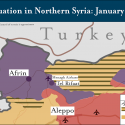Turkey in Review: December 28, 2021 – January 18, 2022
Jan 21, 2022 - ISW Press
Kazakhstan Crisis Exposes Limits of Turkey’s Reach in Central Asia: Rapid developments in Kazakhstan in January 2022 outpaced the Turkey-led Organization of Turkic States’ ability to respond with more than offers of support to the Kazakh government. Ankara’s initial response to the Kazakh crisis was limited to calling for stability and peace. Turkey accelerated its outreach to Kazakhstan, however, after the Russian-led Collective Security Treaty Organization (CSTO) agreed to deploy troops into the Central Asian country. The CSTO deployment, the first time the organization invoked its collective security provision, likely motivated Ankara to take more vigorous steps to ensure Turkey retains a role in Kazakhstan. Kazakhstan remains under a state of emergency imposed in response to widespread unrest that began with localized fuel protests.








